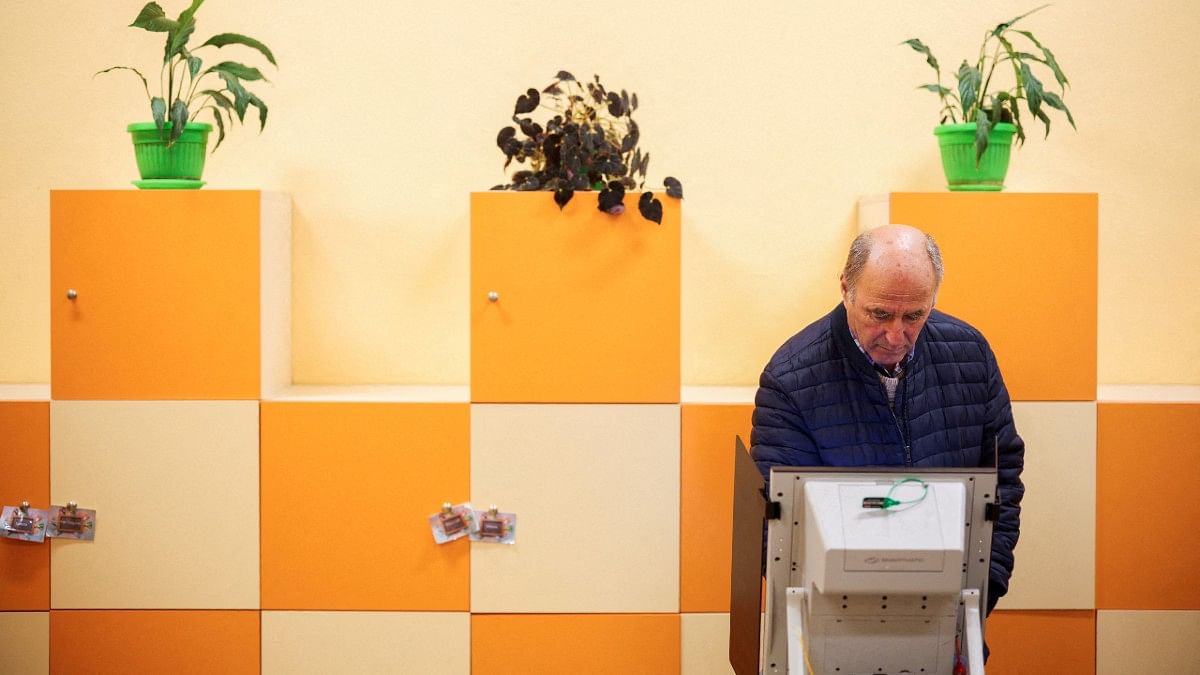New Delhi: Russia’s influence on shaping electoral outcomes is under intense scrutiny, given allegations levelled against the Kremlin in light of outcomes or preliminary results of parliamentary elections in Bulgaria and Georgia, and the presidential election in Moldova.
Since Russia’s invasion of Ukraine in February 2022, these countries have faced mounting pressure from Moscow-aligned forces.
Russia has been accused of using economic, political, and media tactics to steer these nations toward its sphere of influence.
Show Full Article
In Bulgaria, for instance, pro-Russian parties like Revival exploit political instability and EU skepticism to gain ground. In Georgia, pro-Russian narratives undermine EU aspirations, while Moldova confronts alleged vote-buying, media propaganda, and financial manipulation with critics of the Kremlin alleging interference.
On its part, Moscow has denied allegations of meddling. Against this backdrop, ThePrint looks at allegations levelled against Russia in the three former Soviet republics.
Also Read: Massive in size & capable of heavyweight strikes. Russia’s S-70 Okhotnik is unlike any other drone
Bulgaria: Pro-Russian sentiment gains momentum
In Bulgaria, political instability from seven snap elections in four years has created openings for pro-Russian groups to capitalise on public dissatisfaction. This unrest has allowed the far-right Revival party, known for its anti-EU and pro-Kremlin stance, to gain momentum by appealing to voters frustrated with mainstream politics.
Revival leaders have questioned Bulgaria’s NATO membership, pushing instead for closer relations with Moscow. Their nationalist stance has also promoted policies echoing dominant Russian narratives, such as anti-LGBTQ+ laws and anti-Western rhetoric.
Natural gas, for which Bulgaria was largely dependent on Russia until the invasion of Ukraine, remains a vital issue. Though diversification efforts have decreased Moscow’s leverage, Revival argues re-engagement with Russia could stabilise energy costs.
The vote Sunday (27 October) was triggered by failure of mainstream political parties to reach an agreement to form a coalition government after the parliamentary election on 9 June this year threw up inconclusive results.
However, latest opinion polls suggest no single party has been able to muster a simple parliamentary majority, which means the country of nearly seven million is likely staring at a fresh round of long-drawn coalition talks—at the centre of which will be the question of whether the future of Europe is with NATO or Russia and its allies.
Before he demitted office, Bulgaria’s former prime minister Nikolai Denkov had said in April that “Russia will do whatever possible to recover its strong influence in Bulgaria”.
Georgia: At the crossroads of East & West
In Georgia, the ruling Georgian Dream party has shifted its rhetoric, increasingly framing Western institutions as threats, a stance resonant with Russian narratives. This position implies that Georgia’s pro-Western alliances could involve it in the Russia-Ukraine conflict, stirring anxieties among citizens concerned for Georgia’s sovereignty.
Leaders of Georgian Dream, led by billionaire Bidzina Ivanishvili, argue NATO and the European Union (EU) might compromise national security, urging voters to reevaluate affiliations. The controversial “transparency on foreign influence” law, inspired by the crackdown on civil society in Russia, also drew public protest and international criticism.
In a sharp contrast to opinion polls, results of the 26 October parliamentary election paved the way for Georgian Dream’s return to power with at least 54 per cent of the vote.
According to Radio Free Europe, for opposition leader Mikheil Saakashvili, the election represented a choice between democracy and authoritarianism. “This election is a choice between democracy and authoritarianism,” Saakashvili stated, encouraging voters to resist pro-Russian narratives and choose a pro-Western path. Saakashvili and other opposition leaders see this election as a referendum on Georgia’s future, with implications for continued democratic reforms and EU aspirations, given that Georgian Dream had promised to ban all major opposition parties if voters were to grant it a supermajority.
Georgia’s pro-Western President Salome Zurabishvili, who had called for a vote against Georgian Dream, condemned “incidents of violence unfolding at various polling stations”.
At the same time, a French lawmaker who is special coordinator for the Organization for Security and Cooperation in Europe (OSCE) alleged Georgian Dream promoted Russian disinformation, manipulation and conspiracy theories” in the run-up to the election to gain an edge over its political opponents—a coalition of pro-Western opposition parties.
Moldova: Grassroots influence & ‘vote-buying’
In Moldova, Russian interference manifests through alleged vote-buying, media manipulation, and financial support for pro-Russian regions. A BBC report captured on video a voter discussing payments for her vote in what pro-Western politicians termed a clear demonstration of Russian meddling in Moldova’s presidential election.
Fugitive oligarch Ilan Shor, a Kremlin ally, reportedly funded projects in Găgăuzia, a region with strong pro-Russian sentiment. Shor is said to have offered voters in the area $100 per month to support anti-EU campaigns, rallying opposition to Moldova’s pro-EU direction.
President Maia Sandu publicly condemned Russia’s actions, implementing measures at Chisinau airport to limit cash flows alleged intended to influence voters. “Moldova’s sovereignty must be protected from outside manipulation,” she declared, emphasizing her administration’s commitment to electoral integrity.
The EU too has pledged significant financial support to strengthen Moldova’s pro-European government, though structural challenges persist.
With Sandu getting 42.45 percent of the vote, short of the 50 per cent needed for an outright victory, in the first round of the presidential elections held on 20 October, Georgia is headed to a runoff on 3 November with Sandu up against former prosecutor-general Alexandr Stoianoglo, termed by his political opponents as ‘Russia-backed’.
In a referendum held alongside the first round of the presidential elections, 50.46 per cent of Moldovans had backed EU accession. Russia has dismissed allegations that it meddled in the Moldovan presidential election, while questioning the integrity of the referendum.
Vartika Singh is an intern with ThePrint
Also Read: India is exploiting a power vacuum in the Caucasus. It can affect ties with Russia
